November 16, 2022 | The Walrus
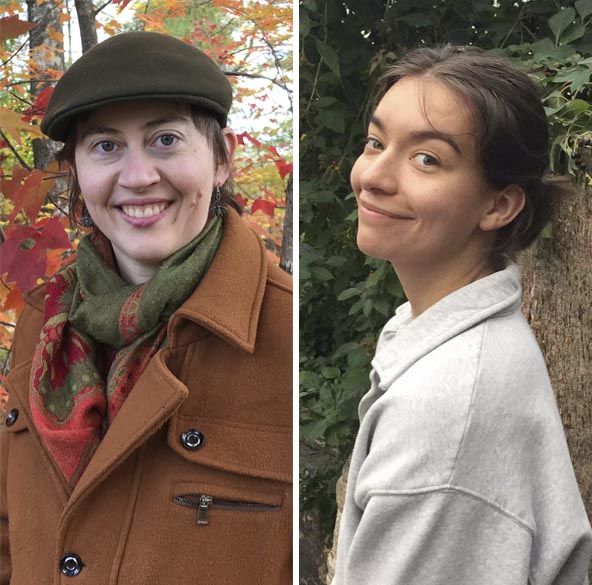
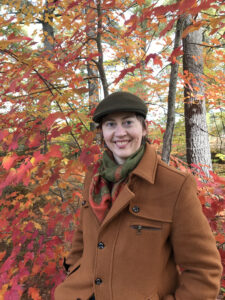
Jay Gordon (BSc 2011) – NSERC PGS Doctoral scholarship
Katia Ossetchkina (CivE 1T8 + PEY) – NSERC CGS Masters scholarship

November 17, 2022 | Forbes
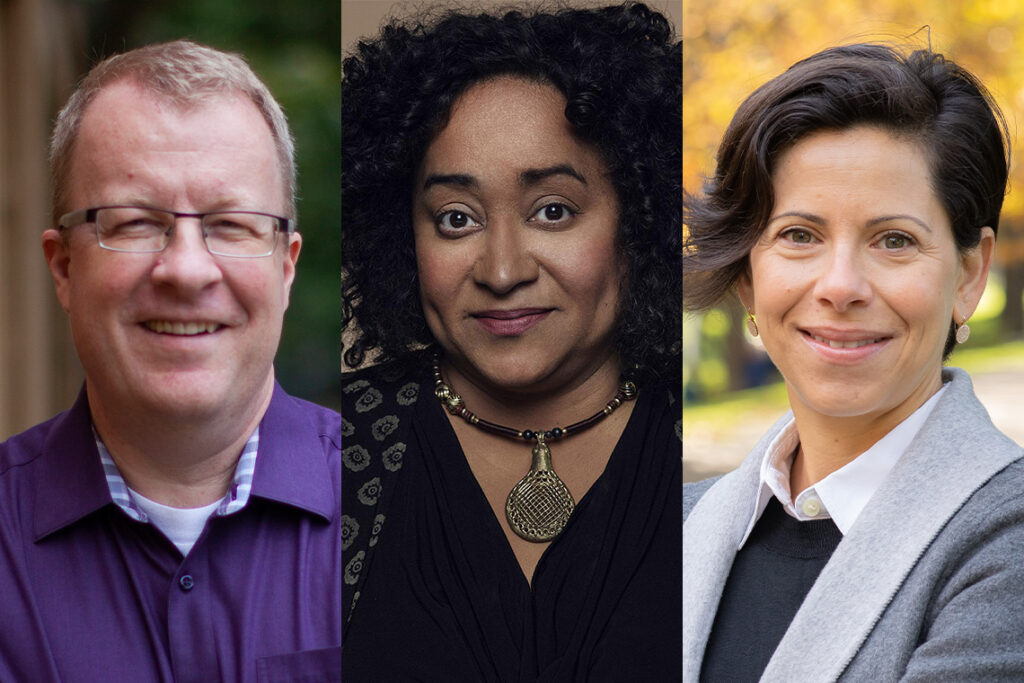
Congratulations to Prof. Marianne Hatzopoulou on being named a new Tier 1 Canada Research Chair in Transport Decarbonization and Air Quality.Hatzopoulou is a professor in the Department of Civil & Mineral Engineering, a director of Positive Zero Transport Futures, and leads the Transportation and Air Quality (TRAQ) research group.“She and her research team are enhancing our capacity to model air quality and environmental justice under decarbonization pathways and to develop new platforms to track human behaviour and air quality across communities and over time. Their findings will help industry, government and communities in Canada and around the world to prioritize transportation innovations that both benefit society and reduce emissions.” – excerpt from Government of Canada Canada Research Chairs website.
Here is the full list of new and renewed Canada Research Chairs at U of T:
New Canada Research Chairs
Aimy Bazylak in the department of mechanical and industrial engineering in the Faculty of Applied Science & Engineering, Tier 1 in clean energy.
Denise Belsham in the department of physiology in the Temerty Faculty of Medicine, Tier 1 in neuroendocrinology.
Maged Goubran at the Sunnybrook Health Science Centre and the department of medical biophysics in the Temerty Faculty of Medicine, Tier 2 in artificial intelligence and computational neuroscience.
Scott Gray-Owen in the department of molecular genetics in the Temerty Faculty of Medicine, Tier 1 in infectious immunopathogenesis.
Robin Hayeems at the Hospital for Sick Children and the Institute of Health Policy, Management and Evaluation in the Dalla Lana School of Public Health, Tier 2 in genomics and health policy.
Marianne Hatzopoulou in the department of civil and mineral engineering in the Faculty of Applied Science & Engineering, Tier 1 in transport decarbonization and air quality.
Caroline Hossein in the department of global development studies at U of T Scarborough, Tier 2 in Africana development and feminist political economy.
Muhammad Husain at the Centre for Addiction and Mental Health and the department of psychiatry in the Temerty Faculty of Medicine, Tier 2 in treatment innovation in mood disorders.
Courtney Jones at the University Health Network and the department of medical biophysics in the Temerty Faculty of Medicine, Tier 2 in leukemia stem cell metabolism.
Andrea Knight at the Hospital for Sick Children and the department of paediatrics in the Temerty Faculty of Medicine, Tier 2 in mental health and chronic disease of childhood.
Sushant Kumar at the University Health Network and the department of medical biophysics in the Temerty Faculty of Medicine, Tier 2 in genomic medicine.
J. Rafael Montenegro Burke in the Donnelly Centre in the Temerty Faculty of Medicine, Tier 2 in functional metabolomics and lipidomics.
Deborah O’Connor in the department of nutritional sciences in the Temerty Faculty of Medicine, Tier 1 in human milk and infant nutrition.
Vijay Ramaswamy at the Hospital for Sick Children and the department of paediatrics in the Temerty Faculty of Medicine, Tier 2 in pediatric neuro-oncology.
Gregory Schwartz at the University Health Network and the department of medical biophysics in the Temerty Faculty of Medicine, Tier 2 in bioinformatics and computational Biology.
Jay Shaw in the department of physical therapy in the Temerty Faculty of Medicine, Tier 2 in responsible health innovation.
Anastasia Tikhonova at the University Health Network and the department of medical biophysics in the Temerty Faculty of Medicine, Tier 2 in stem cell niche biology.
Burton Yang at Sunnybrook Health Sciences Centre and the department of laboratory medicine and pathobiology in the Temerty Faculty of Medicine, Tier 1 in cardiac remodeling.
Darren Yuen at Unity Health Toronto and the department of medicine in the Temerty Faculty of Medicine, Tier 2 in fibrotic injury.
Renewed Canada Research Chairs
John Calarco in the department of cell and systems biology in the Faculty of Arts & Science, Tier 2 in neuronal RNA biology.
Myron Cybulsky at the University Health Network and the department of laboratory medicine and pathobiology in the Temerty Faculty of Medicine, Tier 1 in arterial wall biology and atherogenesis.
David Duvenaud in the department of computer science in the Faculty of Arts & Science, Tier 2 in generative models.
Julie Forman-Kay in the Hospital for Sick Children and the department of biochemistry in the Temerty Faculty of Medicine, Tier 1 in intrinsically disordered proteins.
Bryan Gaensler in the David A. Dunlap department of astronomy and astrophysics in the Faculty of Arts & Science, Tier 1 in radio astronomy.
Alec Jacobson in the department of computer science in the Faculty of Arts & Science, Tier 2 in geometry processing.
Jean-Philippe Julien at the Hospital for Sick Children and the department of biochemistry in the Temerty Faculty of Medicine, Tier 2 in structural immunology.
Kang Lee in the department of applied psychology and human development at the Ontario Institute for Studies in Education, Tier 1 in moral development and developmental neuroscience.
David Levin in the department of computer science in the Faculty of Arts & Science, Tier 2 in simulation-driven graphics and fabrication.
Jed Meltzer at Baycrest Hospital and the department of psychology in the Faculty of Arts & Science, Tier 2 in interventional cognitive neuroscience.
Sean Mills in the department of history in the Faculty of Arts & Science, Tier 2 in Canadian and transnational history.
Kimberly Pernell-Gallagher in the department of sociology in the Faculty of Arts & Science, Tier 2 in economic sociology.
Arun Ramchandran in the department of chemical engineering and applied chemistry in the Faculty of Applied Science & Engineering, Tier 2 in engineered soft materials and interfaces.
Andras Tilcsik at the Rotman School of Management, Tier 2 in strategy, organizations, and society.
Haley Wyatt in the department of biochemistry in the Temerty Faculty of Medicine, Tier 2 in mechanisms of genome instability.
By Scott Anderson
This story originally posted by U of T News
November 14, 2022 | Grounded Engineering
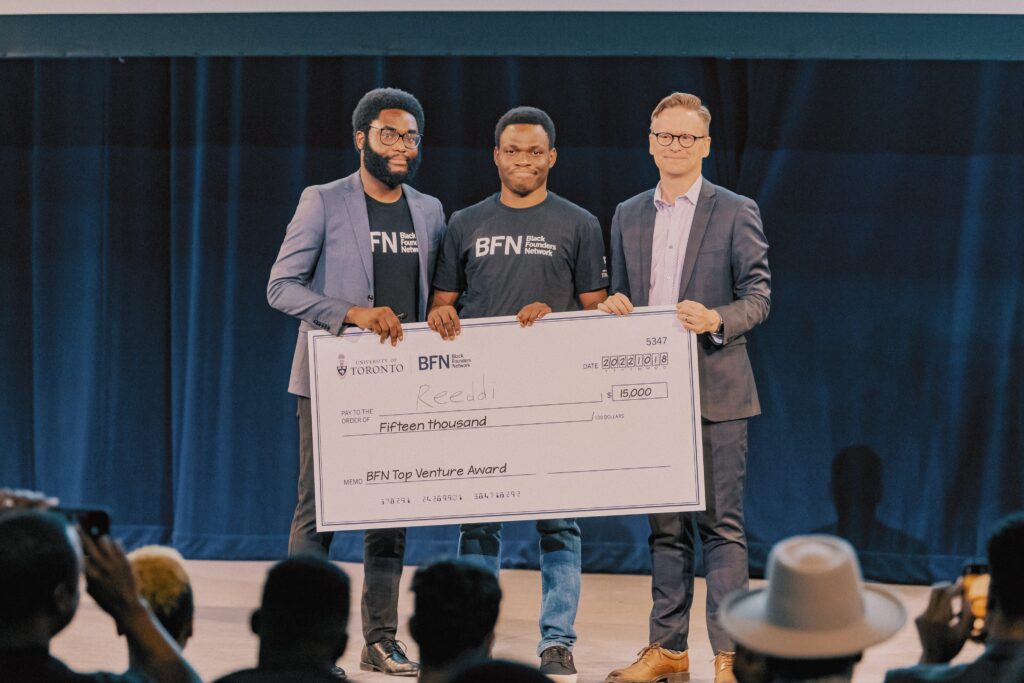
Congratulations to our CivMin alumni Olugbenga Olubanjo (CivE MASc 1T9) for taking home the top Venture Award prize at the Black Founders Network (BFN). The event was held November 9, 2022 at the University of Toronto.
Olugbenaga Olubanji is a founder of an energy startup Reeddi that completed the BFN Accelerate’s four-month bootcamp among eleven others. “What brought me to the BFN was the community of like-minded founders all working to build amazing things,” said Olugbenga. He took the first place BFN Top Venture Award and awarded with a $15,000 grant by the BFN Investor Judges.
Reeddi developed a portable source of affordable and clean electricity suitable both for personal and businesses needs in energy-poor regions of the world. The company provides rentals of compact and portable capsules charged by solar-powered stations located in communities. The companies’ business model provides affordable energy tool for customers and motivates them to return capsules on time by earning credits toward future purchases.
BFN as a part of U of T works to create an inclusive community for Black entrepreneurs. It is aimed to support impactful startups and founders as they launch, fund and scale businesses.
This story was originally published by U of T News.
November 9, 2022 | TVO Today
November 5, 2022 | The Globe and Mail
Three members of our CivMin community are being recognized by the University with one of its highest distinctions. The Arbor Awards are the University of Toronto’s highest honour in recognition of exceptional and longstanding volunteer service.

Chris Andrews
Chris has been a very active member of the Civil Engineering Industry Advisory Board, including serving most recently as chair. He has reinvented the board, set its strategic direction, enabled research opportunities for faculty members, and provided students with employment opportunities and mentorship, among other contributions since 2017.
Angela Bodrozic-Selak (CivE 1T3)
Every year, Angela selects a case study for use as a project in the Municipal Engineering course. She speaks to students four times during the semester. She also trains teaching assistants on how to grade the project and spends up to 50 hours grading projects herself. Angela has significant impact on this course and its students.
Lloyd McCoomb (PhD., P.Eng)
Lloyd’s guidance and leadership were instrumental in growing the University of Toronto Transportation Research Institute into a centre of excellence that is highly regarded by industry and government partners. Lloyd is also chair of the executive committee that organizes the Iron Ring Ceremony for over 2000 student engineers graduating each year from U of T and other universities from across GTA.
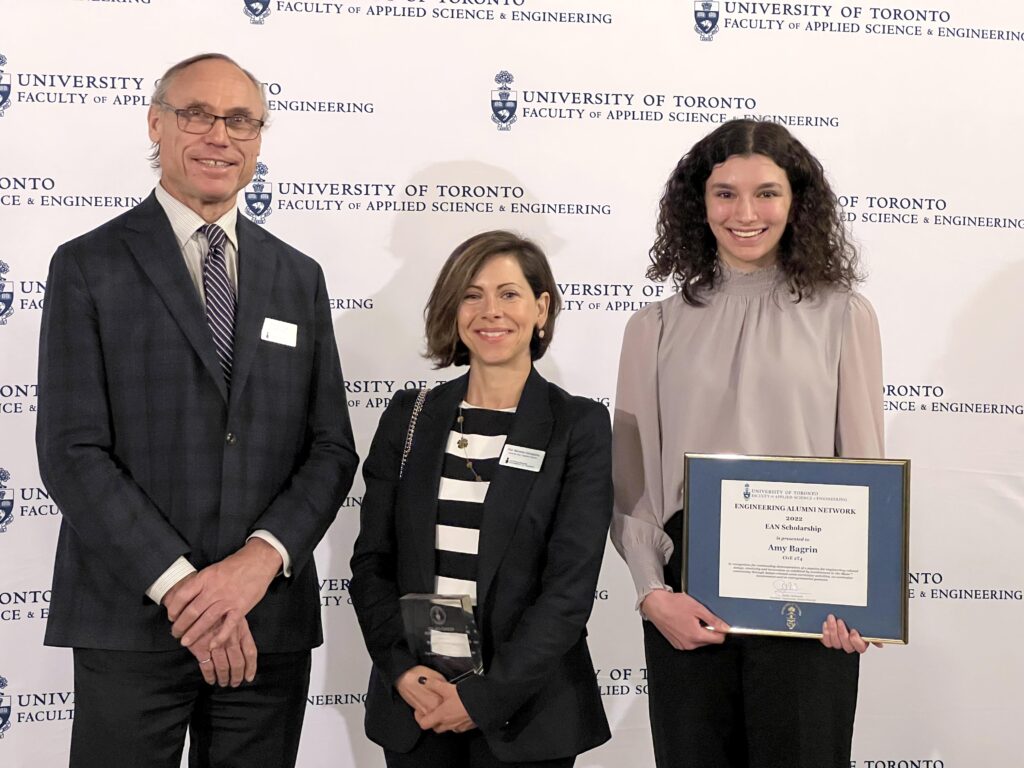
CivMin’s Prof. Marianne Hatzopoulou (CivE PhD 0T8) and undergraduate student Amy Bagrin (CivE Year 3) were recognized by the Engineering Alumni Network (EAN) at their annual EAN Awards event held Thursday, November 3 at Hart House.
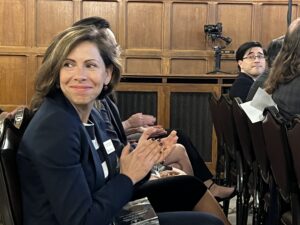
Prof. Hatzopoulou was recognized with the 2T5 Mid-Career Achievement Award, with Bagrin receiving the EAN Scholarship.
Hatzopoulou’s award recognizes a graduate (11-25 years from undergraduate graduation) who has earned respect within the profession as well as the broader Canadian community. She completed her PhD at U of T in 2008 in Transportation Engineering in Civil Engineering, and has been a professor in the Department since 2015 having first started at McGill in 2010.
Currently, Hatzopoulou leads the Transportation and Air Quality (TRAQ) research group studying the interactions between transportation, air quality, climate, and health. She published over 140 publications on these topics. She is also the Director of Positive Zero Transport Futures, a living lab ecosystem for testing transport decarbonization innovations with positive societal outcomes. She received funding from provincial, federal, and international agencies to conduct integrative research in transportation engineering and public health. Prof. Hatzopoulou held a Tier2 Canada Research Chair in Transportation and Air Quality (2013-2021) and a Natural Sciences and Engineering Research Council (NSERC) Discovery Accelerator Supplement (2016-2019). She is on the Canadian team that received the 2021 NSERC Brockhouse Canada Prize for Interdisciplinary Research in Science and Engineering. She serves on the Transportation Research Board standing committee on Air Quality and Greenhouse Gas Mitigation as the committee research coordinator. She is also an associate editor of the journal Transportation Research Part D: Transport and Environment.
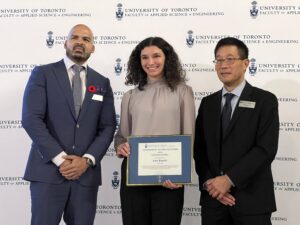
Bagrin’s award is presented to a part-time or full-time student in good standing, proceeding to second, third or fourth year in any program in the Faculty. Recipients are selected based on the demonstration of a passion for engineering-related design, creativity and innovation as exhibited by involvement in the Skule™ community through design-related extra-curricular activities, co-curricular involvement and/or entrepreneurial pursuits.
She is a third-year Civil Engineering student, currently pursuing a minor in Engineering Business. During her time at U of T, she has grown as a leader and gained a love for the Skule™ community at large. She aims to deliver equitable and accessible F!rosh Week programming to the incoming first-year engineering students through her work for the finance portfolio of the Orientation Committee, starting as a subcommittee chair and moving on to be the Vice-Chair Finance. She also organizes events and initiatives for her peers through her work for the Civil Engineering Club (aka Civ Club). As the former Social Director and acting Vice Chair, she engages and strengthens the Civil Engineering student body, representing their interests to the department and faculty. In 2022, Amy served as a captain on the U of T Troitsky design team, leading her team to victory at the national Troitsky Bridge Building Competition. Upon graduating, Amy hopes to continue her work in drinking water treatment through the water resources management stream or further explore business in the construction management industry.